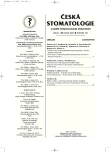-
Medical journals
- Career
State of Dentition in Non-Cooperative Children Treated at the Stomatological Clinic in Brno in 2004
Authors: L. Pantuček; M. Kukletová; Z. Halačková; L. Izakovičová-Hollá 1; J. Kuklová; M. Svobodová
Authors‘ workplace: Stomatologická klinika LF MU a FN U Sv. Anny, Brno přednosta prof. MUDr. J. Vaněk, CSc. ; Ústav patologické fyziologie LF MU, Brno přednosta prof. MUDr. A. Vašků, CSc. 1
Published in: Česká stomatologie / Praktické zubní lékařství, ročník 107, 2007, 1, s. 3-9
Category:
Overview
The study has analysed situation in non-cooperative children admitted for dental treatment in 2004. The aim of the study was to evaluate the prevalence of dental caries in 6–19-year-old children (N = 78) treated under general anaesthesia (GA), and to compare the treatment plan based on a child patient’s preliminary examination and the treatment need assessed during the respective therapy. The type of health insurance, reason for poor cooperation and referring facility were followed as well. Dental records of 78 children (mean age 11.5, SD 3.27) were used, the data were gathered and evaluated. The children were divided into 4 groups based on the diagnosis: mental retardation (N = 11), phobia (N = 40), combination of severe diagnoses n = 14), other diagnoses (N = 13). Components and restorative index were calculated. Differences between boys and girls were tested by Fisher-exact test. DMFT of the group was 4.4, DT: 3.85, FT: 0.45, ET: 0.13, RI: 7.77%. DMFT was significantly higher in girls (p = 0.0008) and in the component FT (p = 0.004). The treatment need determined during the therapy under GA was lower than that assessed during the examination. The mean interval between the investigation and treatment under GA was 50.25 days, the mean duration of the treatment under GA was 73.61 minutes. The most frequent referring facility was the private dental practice, most patients belonged to the General Health Insurance. The study has demonstrated poor oral health status in non-cooperative children. Parents and persons taking care of handicapped and non-cooperative children should be trained in caries prophylactic methods to prevent dental decay and its complications.
Key words:
non-cooperative patient – DMFT – mental retardation – phobia – general anaesthesia
Labels
Maxillofacial surgery Orthodontics Dental medicine
Article was published inCzech Dental Journal

2007 Issue 1-
All articles in this issue
- I. Thin Layers of Biocompatible Hydroxyapatite and Zircon – Physical Properties
- Influence of Corrosion on the Origin of Pigmentation of Soft Tissue
- Internal Granuloma – Present State of the Problem
- The Causes of Origin and Present Possibility for Treatment of Alveolitis (A Review)
- State of Dentition in Non-Cooperative Children Treated at the Stomatological Clinic in Brno in 2004
- Direct Applications of Fiber. Composites Substitution of Missing Frontal Teeth
- What is the Silicon Matrix?
- Czech Dental Journal
- Journal archive
- Current issue
- Online only
- About the journal
Most read in this issue- Internal Granuloma – Present State of the Problem
- What is the Silicon Matrix?
- Direct Applications of Fiber. Composites Substitution of Missing Frontal Teeth
- The Causes of Origin and Present Possibility for Treatment of Alveolitis (A Review)
Login#ADS_BOTTOM_SCRIPTS#Forgotten passwordEnter the email address that you registered with. We will send you instructions on how to set a new password.
- Career

